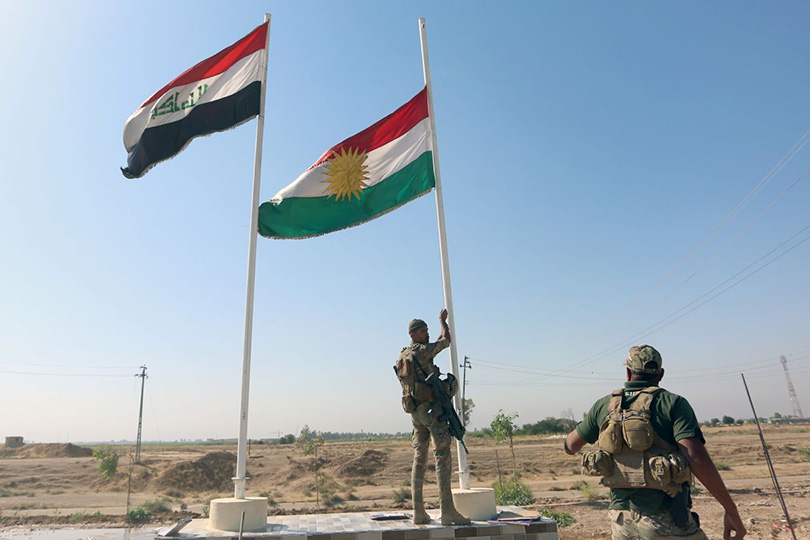After World War I, the Kurds came tantalizingly close to getting an independent state. Nearly a century later, they are no closer to an independent homeland.
There are many reasons for this: regional instability; suppression of the Kurds, most dramatically in Turkey and Saddam Hussein’s Iraq; vehement opposition to a Kurdish state; infighting among Kurds; and, despite some prominent Western supporters, no viable advocate for Kurdish statehood. These reasons were on display this week as Iraqi forces took control of Kirkuk, the disputed oil-rich city that Kurds see as their Jerusalem. Kurdish fighters had controlled the city since 2014, when Iraqi forces fled the area in the face of an ISIS onslaught. What made the situation even more precarious was last month’s referendum, in which an overwhelming number of Kurds voted for an independent homeland in what is now Iraqi Kurdistan. The referendum was also conducted in three areas with significant Kurdish populations, including Kirkuk, that are deemed disputed areas by the 2005 Iraqi constitution. That document was approved in most of Iraq by wide margins, but in Iraqi Kurdistan more than 98 percent of voters endorsed it.
The aftermath of this vote and the seizure of Kirkuk is playing out in a predictable fashion—finger-pointing among the Kurds, an attempt at neutrality by the United States, decisive action by Iran, and a flexing of muscles by the Iraqi state—but it also raises two questions: Why wasn’t the U.S. able to persuade one of its most reliable allies in the region to postpone the referendum? And why doesn’t Washington support Kurdish independence outright?
“There is no ambiguity on what the U.S. position was on this issue. The United States has been telling the Kurds and telling [Kurdish President] Masoud [Barzani], and telling Masrour [Barzani, his heir apparent] since last spring not to proceed with this because this would be not good for Kurdistan, not good for Iraq, and would play into the hands of the hardliners and the hands of the Iranians,” said Stuart Jones, the former ambassador to Iraq, now at the Cohen Group. “And I think that’s what we’re seeing.”
Barzani’s call for a referendum has been called a miscalculation, but the Kurdish leader has long maintained that as long as Iraqi Kurds are part of the state of Iraq, they will not get a square deal. Bayan Sami Abdul Rahman, the KRG’s representative in Washington, told me that the best U.S. offer to postpone the referendum came far too late for the vote to be delayed. “We didn’t have confidence that Baghdad would have stood by it anyway,” she said. Abdul Rahman said Kurds are consistently told it’s not a good time for independence. “From our perspective, it’s always a bad time,” she said. “If you’re looking for a moment when Iraq is stable and you have somebody reasonable to negotiate with, that’s never been the case in Iraq.”
She said the Kurds knew there would be opposition to the referendum, pointing to the fact that the U.S. and its Western allies have traditionally been against independence movements. She cited the example of the Baltic states and Croatia, noting that “those countries would still be part of the” eastern bloc “if American policies of the day had carried through.”
“So, we expected opposition. We thought that would be the pattern,” she said. “Where we were surprised is the hostility to the referendum, the disrespect, the attempt to belittle the referendum.”
There are two main overlapping theories for why Iraq and its allies, including the U.S., reacted the way they did: the referendum itself was problematic and the inclusion of Kirkuk and the disputed areas was provocative. As Fareed Yasseen, the Iraqi ambassador to Washington, told me: “The referendum would still be unconstitutional, but with Kirkuk it’s even more blatantly anti-constitutional.”
“It’s a federal entity trying to assert its federal authority,” he said. “If you pitch it in an American context it becomes very clear: The situation we’ve had is, for example, if Texas would prohibit agents from TSA to be present at Houston airport. It doesn’t work that way. … It can’t work that way.”
Peter Galbraith, a former U.S. diplomat who has been a vocal advocate for Kurdish independence, says “it’s baffling” why the U.S. doesn’t recognize a Kurdish state. Galbraith, who was in the KRG for the recent referendum as an unpaid adviser to the Kurds, pointed out that the area has long been a bastion of stability in Iraq. “Could a place of 5 million people be a viable place?” he asked. “I would think so. It’s larger and more viable than half the states in the United Nations.”
Indeed, the KRG is slightly bigger than the U.S. state of Maryland and about the size of Switzerland. But what it does have in area and population it lacks in the factors that make a stable state. Jones, who was U.S. ambassador from 2014 to 2016, argued those reasons are why the U.S. doesn’t support an independent Kurdish state at the moment.
“A: The KRG is not economically viable. B: The political conditions were simply not prepared. We’re seeing that,” he said. “There’s a very sharp reaction from Iran. There’s a sharp reaction from Turkey. A sharp reaction from Baghdad. So the neighbors weren’t prepared for this. They weren’t willing to go along. There were a lot of issues that were not resolved.”
Regional reaction may, in part, be the reason why the Iraqi government acted in the manner it did. As I wrote earlier this week, now that ISIS is all but defeated, the region’s dormant conflicts are resurfacing. Iran, Syria, and Turkey have significant Kurdish minorities and Tehran and Ankara, especially, fear that an independent Kurdish state would embolden Kurdish separatist forces in their own countries. Turkey, which traditionally has been close to the Barzani family, and Iran, which enjoys influence with the rival Talabani family (the two families have dominated Kurdish politics for decades), stepped in. Turkey called the referendum a “big mistake” and threatened to stop buying oil from the Kurds. Iran was more direct. Qassem Soleimani, the head of the Quds force of the Islamic Revolutionary Guard Corps, was in Iraqi Kurdistan last weekend, meeting with the Talabani-allied Patriotic Union of Kurdistan to mediate a resolution to the standoff. It appears to have worked. PUK fighters withdrew from Kirkuk this week, handing the city over to Iraqi government forces.
If there is one thing that is clear from the crisis in Iraq it is that 14 years after the U.S.-led invasion that ousted Saddam, Iran maintains a significant influence in the country—not only with the central government in Baghdad, which is dominated by its fellow Shia Muslims, but with the Kurds. This will especially be a factor as the U.S. continues to attempt to counter Iran, first by the Trump administration’s decision to send the nuclear deal back to Congress and then by imposing terrorism-related sanctions on the IRGC, the same group in which Soleimani is a senior commander.
“We certainly can counter Iran’s influence, but we can’t negate it,” Jones told me. “Iran had influences in these places before and will continue to have influence. It has an 800-kilometer border with Iraq, including with the PUK-controlled portion of the KRG in northern Iraq. Conditions in Iraq are vital to Iranian national security. There’s no way that Iran is not going to be a player.”
Ryan Crocker, who was U.S. ambassador to Iraq from 2007 to 2009, said the U.S. has weakened its position by appearing to take Baghdad’s side in the dispute with the Kurds. “I do not think we should have taken a position one way or the other on a Kurdish state in northern Iraq: It’s for the Kurds and Iraqis to work out,” he said. “But by injecting ourselves on one side of this ... [the] concern is that we will no longer be seen as an honest broker as we move ahead.”
Any negotiations involving Iraqi Kurdistan’s future will involve not only Iraq and the Kurds, but also Iraq’s neighbors. Another significant issue: the extent of the fissures between the Kurdistan Democratic Party and the PUK. The two parties, whose controlling families have been at odds for decades, have come together at crucial moments in Kurdish history to seize a political opportunity. This week was not one of those occasions.
Abdul Rahim, the KRG’s representative in Washington, lamented the “naive, greedy people who sold out Kirkuk.” She added: “Disunity is definitely our Achilles heel. Kurdish disunity is our worst enemy. Whatever we think of our opponents and detractors, our disunity is our worst enemy.”
But Michael Rubin, a resident scholar at the American Enterprise Institute, who has written about corruption in the KRG, the lack of political transparency, and the dynastic nature of Kurdish politics, said Iraq and the Kurds will likely find a way forward. “The issue in the long term, I suspect,” he said, “will be less the Baghdad-Erbil dynamic than whether and how Kurds will address their own leaderships’ failings.”
These dynamics notwithstanding, Kurdish leaders have in the past articulated why declaring outright independence would be challenging. Jalal Talabani, the late Kurdish leader who at the time was Iraq’s president, told The New Yorker in 2007:
Let us imagine that Iraqi Kurdistan declared independence, and Iran, Syria, Turkey, and Iraq didn’t fight it but just closed their borders. How could we live? Let us say, we’ve got our oil—how could we export it? And you can be sure that if Kurdistan declares independence Iran will attack, Turkey will attack, Syria will attack—and Iraq will not accept it. We cannot resist all these countries.
A decade later, those concerns appear all the more real, even though they now involve countries that are often at odds and sometimes at each other’s throats.
“On this issue, the U.S., Iran, Saudi Arabia, Turkey, and Iraq all have aligned interests,” Yasseen, the Iraqi ambassador, told me. “They want stability in Iraq—and the referendum went against that stability.”







Comments